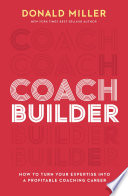

In 'Coach Builder', the author emphasizes the pivotal role coaches play in personal and professional development. Coaches serve as guides, helping individuals navigate their paths, identify their strengths, and overcome obstacles. The book illustrates how effective coaching can lead to enhanced self-awareness, improved performance, and the ability to set and achieve meaningful goals. The author discusses various coaching methodologies and how they can be applied in different contexts, whether in sports, business, or personal growth. The importance of building a trusting relationship between coach and client is highlighted, as this trust forms the foundation for effective coaching. The book also addresses the concept of accountability, where coaches not only support but also challenge their clients to push beyond their limits and reach their full potential.
Continue readingAnother critical idea presented in 'Coach Builder' is the necessity of cultivating a coaching mindset. This mindset involves adopting a perspective that values growth, learning, and resilience. The author argues that anyone can benefit from thinking like a coach, whether they are in a formal coaching role or not. This mindset encourages individuals to ask powerful questions, listen actively, and provide constructive feedback. By fostering a coaching mindset, individuals can enhance their interactions with others, promote collaboration, and create an environment conducive to growth. The book provides practical exercises and examples to help readers develop this mindset, making it applicable in both personal and professional settings.
Continue readingGoal setting is a fundamental theme in 'Coach Builder'. The author elaborates on the significance of setting clear, achievable goals and how they serve as a roadmap for success. The book discusses various goal-setting frameworks, such as SMART goals (Specific, Measurable, Achievable, Relevant, Time-bound), and how to tailor them to individual needs. The author also emphasizes the importance of aligning personal values with goals, ensuring that the pursuit of these goals brings fulfillment and satisfaction. Additionally, the book explores the psychological aspects of goal setting, including motivation and the impact of visualization techniques. By understanding and applying effective goal-setting strategies, readers can enhance their focus and drive towards achieving their aspirations.
Continue readingEffective communication is highlighted as a cornerstone of successful coaching in 'Coach Builder'. The author delves into various communication techniques that foster understanding and connection between coaches and their clients. This includes active listening, non-verbal communication, and the art of asking open-ended questions. The book illustrates how communication is not just about exchanging information but also about creating a safe space for dialogue and exploration. Readers are encouraged to practice these skills, as they are essential not only in coaching relationships but also in everyday interactions. The author provides scenarios and role-playing exercises to help readers develop their communication skills, allowing them to become more effective in their personal and professional lives.
Continue readingFeedback is a critical component of the coaching process, as discussed in 'Coach Builder'. The author stresses that constructive feedback is essential for growth and improvement. The book outlines the principles of giving and receiving feedback effectively, emphasizing the need for specificity, timeliness, and a supportive approach. The author also explores the psychological barriers that often hinder individuals from accepting feedback and provides strategies to overcome these challenges. By creating a culture of feedback, both coaches and clients can engage in continuous learning and development. The book encourages readers to view feedback as an opportunity for growth rather than criticism, fostering a mindset that embraces learning from experiences.
Continue readingThe concept of a coaching culture is a significant theme in 'Coach Builder'. The author argues that organizations that embrace coaching practices can enhance employee engagement, productivity, and overall performance. The book outlines the steps necessary to cultivate a coaching culture, including leadership buy-in, training for coaches, and integrating coaching into the organizational framework. The author provides case studies of organizations that have successfully implemented coaching cultures and the positive outcomes they experienced. By fostering a coaching culture, organizations can empower employees, promote collaboration, and create an environment where continuous improvement is valued.
Continue readingFinally, 'Coach Builder' addresses the importance of measuring the success of coaching initiatives. The author discusses various metrics and evaluation methods that can be used to assess the impact of coaching on individual and organizational performance. This includes qualitative measures, such as client satisfaction and personal growth, as well as quantitative metrics, such as productivity and retention rates. The book emphasizes that measuring success is crucial for understanding the effectiveness of coaching and for making informed decisions about future coaching investments. By implementing robust evaluation processes, organizations can ensure that their coaching efforts yield meaningful results.
Continue readingThe reading time for Coach Builder depends on the reader's pace. However, this concise book summary covers the 7 key ideas from Coach Builder, allowing you to quickly understand the main concepts, insights, and practical applications in around 24 min.
Coach Builder is definitely worth reading. The book covers essential topics including The Role of a Coach in Personal Development, Developing a Coaching Mindset, The Power of Goal Setting, providing practical insights and actionable advice. Whether you read the full book or our concise summary, Coach Builder delivers valuable knowledge that can help you improve your understanding and apply these concepts in your personal or professional life.
Coach Builder was written by Donald Miller.
If you enjoyed Coach Builder by Donald Miller and want to explore similar topics or deepen your understanding, we highly recommend these related book summaries:
These books cover related themes, complementary concepts, and will help you build upon the knowledge gained from Coach Builder. Each of these summaries provides concise insights that can further enhance your understanding and practical application of the ideas presented in Coach Builder.